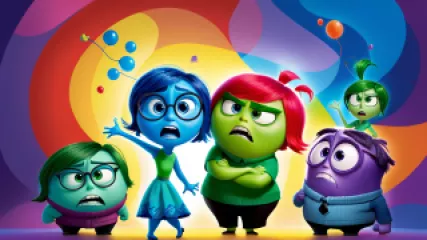Lessons from 'Inside Out' to Understand Your Moods
The human mind is a complex and fascinating entity. Our emotions play a significant role in shaping our experiences and influencing our behaviors. Understanding our moods and emotions can empower us to navigate through life's challenges with greater clarity and resilience. One powerful tool that can help us gain insights into our emotional landscape is the animated film 'Inside Out.' Directed by Pete Docter, this Pixar masterpiece takes us on a journey through the mind of an 11-year-old girl named Riley, personifying her emotions as distinct characters.
Introduction to 'Inside Out'
'Inside Out' offers a unique perspective on how our emotions work together to shape our thoughts, memories, and overall well-being. The film introduces us to Joy, Sadness, Anger, Fear, and Disgust, who reside in Headquarters, the control center of Riley's mind. Each emotion has its distinct purpose and contributes to Riley's emotional responses.
As we delve into the lessons from 'Inside Out,' we will explore how understanding our emotions can enhance our self-awareness and improve our emotional well-being. Let's embark on this journey of self-discovery and learn valuable lessons from the colorful world of 'Inside Out.'
Lesson 1: Embrace the Complexity of Emotions
'Inside Out' beautifully depicts the complexity of emotions and encourages us to embrace the full range of our emotional experiences. In the film, Joy tries to keep Sadness at bay, believing that happiness is the key to a fulfilling life. However, as the story unfolds, we discover that suppressing emotions can be detrimental to our overall well-being.
"You need me, Sadness." - Joy
Sadness teaches us that it's okay to feel down at times and that expressing our emotions can lead to healing and growth. By acknowledging and accepting our emotions, we can develop a healthier relationship with ourselves and others.
Lesson 2: The Importance of Sadness
Sadness often gets a bad reputation as an undesirable emotion. However, 'Inside Out' reminds us of the crucial role it plays in our lives. Sadness allows us to process difficult experiences, empathize with others, and seek support when needed.
"Crying helps me slow down and obsess over the weight of life's problems." - Sadness
When we allow ourselves to experience sadness, we create space for healing and personal growth. It's essential to remember that sadness is not a sign of weakness but rather a natural part of the human experience.
Lesson 3: The Value of Mindfulness
'Inside Out' emphasizes the importance of mindfulness in understanding and managing our emotions effectively. Mindfulness involves being fully present in the moment, observing our thoughts and feelings without judgment.
"I just want Riley to be happy." - Joy
While Joy strives to keep Riley's life happy and carefree, she learns that true emotional well-being comes from embracing all emotions. Practicing mindfulness allows us to observe our emotions without getting caught up in them. By cultivating this awareness, we can respond to our emotions in a more balanced and constructive manner.
Lesson 4: The Impact of Core Memories
In 'Inside Out,' core memories hold significant influence over Riley's personality and emotional development. These pivotal memories shape her Islands of Personality, representing different aspects of her identity.
"Do you ever look at someone and wonder, 'What is going on inside their head?'" - Joy
We can apply this concept to our own lives by recognizing the core memories that have shaped our beliefs and behaviors. Reflecting on these memories allows us to gain insight into our emotional responses and make conscious choices about how we want to navigate the world.
Lesson 5: Nurturing Emotional Connections
'Inside Out' highlights the importance of nurturing emotional connections with others. We witness how Riley's emotions collaborate and rely on each other to support her well-being. This reminds us that building healthy relationships and seeking emotional support are crucial for our overall happiness.
"We're Riley's emotions. We're her friends too." - Joy
By fostering open communication and empathy in our relationships, we create a supportive environment where emotional well-being can thrive. Sharing our struggles and joys with trusted individuals can help us process our emotions and feel understood.
Conclusion
'Inside Out' provides us with a valuable framework for understanding and exploring our emotions. By embracing the complexity of our emotional landscape, acknowledging the value of sadness, practicing mindfulness, reflecting on core memories, and nurturing emotional connections, we can enhance our emotional well-being.
Just like Riley's mind, our emotions work together to shape our experiences. By learning from 'Inside Out,' we can develop a deeper understanding of our moods and emotions, leading to a more fulfilling and authentic life.






